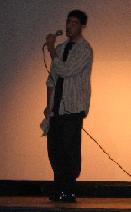A Tale of Two Pitches
 Last year Ryan and I pitched American Jedi in the pitch competition at the Austin Film Festival. The story about an obsessed fan that sets out to kill George Lucas for ruining Star Wars was an unequivocal hit. We rehearsed the pitch and delivered it pretty much as practiced. The judges and the audience loved it. When we presented in the pitch finals we made the audience laugh several times and when we concluded the entire room erupted in cheers. I’ve never felt so proud. Our hard work had paid off in spades, and the afterglow of the victory lingered for quite awhile. It was a moment I will never forget.
Last year Ryan and I pitched American Jedi in the pitch competition at the Austin Film Festival. The story about an obsessed fan that sets out to kill George Lucas for ruining Star Wars was an unequivocal hit. We rehearsed the pitch and delivered it pretty much as practiced. The judges and the audience loved it. When we presented in the pitch finals we made the audience laugh several times and when we concluded the entire room erupted in cheers. I’ve never felt so proud. Our hard work had paid off in spades, and the afterglow of the victory lingered for quite awhile. It was a moment I will never forget.This year I utilized the general structure of the original pitch. I crafted a solid presentation and practiced the hell out of it. Indeed I was more prepared for this pitch than the year before. I was confident. I felt I had a leg up on the competition. So it came time for my pitch. I stood up there and delivered it just as I had practiced. A little rushed, but overall a decent attempt.
And then the roof caved in.
One of the judges liked my idea about how a football player’s runaway ego threatens not only his pro career but an entire team’s fading Super Bowl dreams. The other judge hated it. Both of them agreed that my pitch was too rehearsed and didn’t sound conversational. I scored better than the person ahead of me, but worse than practically everyone else. Needless to say I didn’t advance to the finals and a teary Steven Spielberg did not stuff a bag full of money and hop the next plane to Austin with dreams of football glory in his eyes.
I could complain about how I delivered my pitch within the 90 seconds while the winners were cut off before finishing. I could even argue the merits of my story, but when it comes down to it, they were better than me on that day, and the judges were right. My pitch was more of a speech than a conversation. What worked with a comedy and a two person team a year before did NOT work with a drama and one person this time.
When looking back, it is very clear what the problem was. While writing a rehearsing I would comment to myself that I had too many complex sentences, but I decided to lock the script and focus on rehearsal. Another problem was that I had a script. We used a script a year before, but because we traded lines it seemed way more casual and conversational. We also used more conversational sentences. With one person, you really need to come across as genuine and talk to and not at the judges.
So what have I learned? What will I do different next year? The biggest change is that I will have no script and that I will have talking points and endeavor to keep it under 90 seconds, but unless the scoring system changes to penalize people who run over, I won’t worry too much about finishing. But the biggest thing I learned is to not search for a formula and to listen to that inner critic trying to warn me of danger. He is decidedly different than my inner asshole who insists on telling me that I’m doomed to fail.


1 Comments:
At 12:57 AM, Patrick J. Rodio said…
Patrick J. Rodio said…
Sorry you bombed. It probably went better than you think it did though.
I meant to ask you, did you guys get anything off of American Jedi (including from the pitch win/website/script)? Understanding that the actual script/idea might be unsellable (Lucas would crush any involved like the souls of his adopted kids) but I figure you guys might be able to get some writing work from any interested parties.
Post a Comment
<< Home